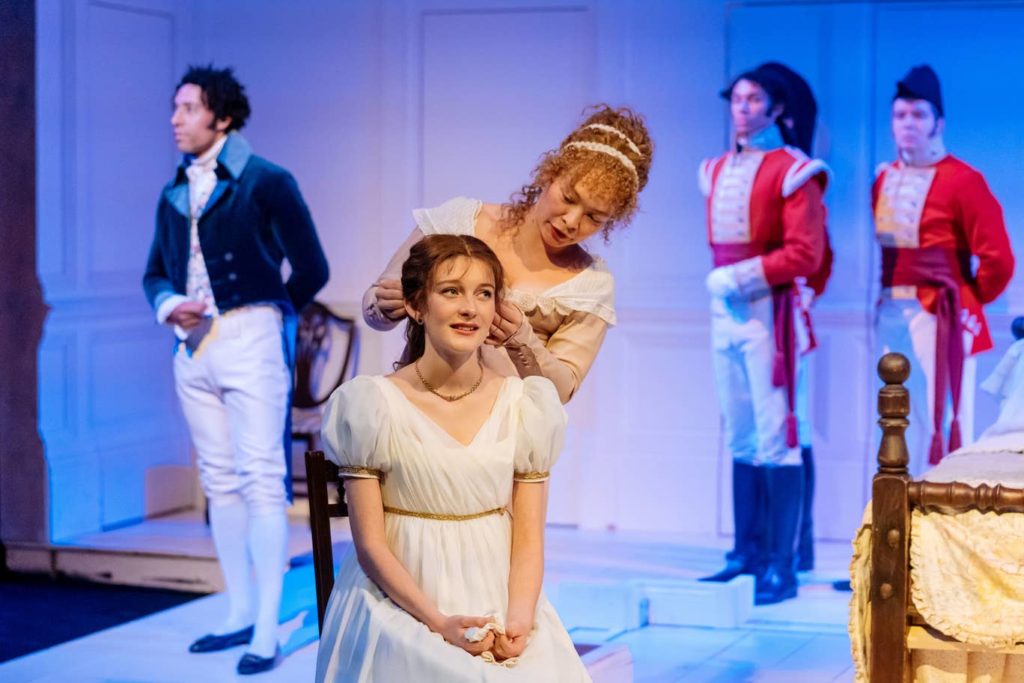
Does anyone still wear – gloves? Royals, of course, still consider them an essential element in the capsule wardrobe – anything to protect them from the clammy-handed flesh of the commonweal. Driving gloves suit men of a certain age and Rover-loving air of Alan Partridge. And commuters scatter single woolly numbers on public transport all through the winter.
But a lady’s elegant, elbow-tweaking white gloves? Or a gentleman’s svelte riding gloves? Spot these on stage, my friends, and you can rest assured that you are safely encased in the genteel past. Dickens World. Downton World. Best of all, Austen World.
At least, that’s how it seems when The Watsons begins. Based on Jane Austen’s unfinished mid-period novel, Laura Wade’s script offers period drama familiarity. Sharp-eyed heroine whose wits outweigh her income. Supporting cast of silly siblings, meddling in-laws and snooty gentry, plus potential husbands ranging from sexy to steadfast.
In Samuel West’s nimble production, the first few scenes are satisfyingly glove-y. Emma (Grace Molony) first appears carrying a pair of tighty whities as she prepares for a swank local ball, her first since returning from living with a rich aunt to her relatively cash-strapped sisters. The evening gloves complement her snowy frock: Emma knows ball rules.
She soon meets the cad, the dullard and the standoffish, awkward local aristocrat (Joe Bannister), whose manner is cold but whose wealth is hot. He comes calling the next day, to initiate a ham-fisted courtship. His best tactic is to snatch some extra chat by pretending he forgot his chestnut, suede gloves – a tactic that might succeed if only he wasn’t still holding them.
Gloves as a sign of social manoeuvres or as a gambit in the marriage plot send out palm-huggingly comfortable signals. We know where we are – at least, until Emma prepares to plunge into story-ending marriage with the lord, and ‘Laura’ (Louise Ford), the modern playwright, feels moved to intervene. Laura has taken Austen’s existing pages and the thoughts she supposedly shared with her sister about the plot, and is set on honouring Austen’s intentions.
But, once Emma and the other characters become aware of 21st-century accessories (phone, trousers for women) and of their own fictionality on Ben Stones’ icing-white set, they are reluctant to follow authorial orders. It is, as Laura admits through gritted teeth, all very Pirandellian. The gloves are off, and soon discarded – Wade nicely dramatises the tension in the way that even ‘strong female characters’ in period drama can only demonstrate that strength within the whalebone confines of a courtship narrative.
Maybe – gasp – a fictional world can make its own rules? Forget gloves, here come sunglasses, DJ decks, an actual astronaut. More crucially, here comes female self-determination, sexual self-expression, love that follows the heart and work that follows the passions.
The Watsons is a short, smart burst of pleasure. I’ve also been dipping in and out of Sanditon, a tv series based on another unfinished Austen tale. It too has to outpace its origins – and whereas the play follows colourblind casting convention, the tv drama explicitly runs with Austen’s suggestions about characters of colour. In other ways, it’s cosily predictable – autogenerating plot points that function in exactly the way Emma resists.
Wade has previously written piercingly about the dangerous lure of nostalgia – in Home, I’m Darling, which opened just months before The Watsons premiered in Chichester last year. Those sleek white gloves are reassuring, but think of all you can’t do while wearing them. Anything mucky. Anything tactile. Anything bodily. Playful and meta-theatrical, The Watsons tweaks a lovingly replication of a throwback world – where romance and restriction go hand in glove.
Above: Grace Molony (gloves in hand) with Paksie Vernon. Photo by Manuel Harlan. The Watsons was first produced at Chichester in 2018, and is at the Menier Chocolate Factory until 16 November.
Follow David on Twitter: @mrdavidjays

Leave a Reply